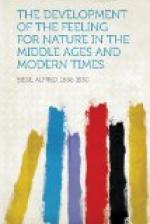[Footnote 14: In his Harburg Program of 1883 (Beitraege zur Geschichte des Naturgefuehls), after an incomplete survey of ancient and modern writings on the subject, Winter sketches the development of modern feeling for Nature in Germany from Opitz to 1770, as shewn in the literature of that period, basing his information chiefly upon Goedeke’s Deutsche Dichtung.]
[Footnote 15: Comp. Chovelius Die bedeutendsten deutschen Romanz des 17 Jahrhunderts. Leipzig, 1866.]
[Footnote 16: Chovelius.]
[Footnote 17: Daniel Lohenstein’s Blumen. Breslau, 1689.]
CHAPTER IX
[Footnote 1: Freiherr von Ditfurth, Deutsche Volks und Gesellschaftslieder des 17 und 18 Jahrhunderts, 1872.]
[Footnote 2: Goedeke-Tittmannschen Sammlung, xiii., Trutz-Nachtigall.]
[Footnote 3: Geschichte der deutschen Litteratur.]
[Footnote 4: Tittmann’s Deutsche Dichter des 17 Jahrhunderts, vol. vi.]
[Footnote 5: Comp., too, iv. 5: ’Die ihr alles hoert und saget, Luft and Forst und Meer durchjaget; Echo, Sonne, Mond, und Wind, Sagt mir doch, wo steckt mein Kind?’
21. ’Den sanften West bewegt mein Klagen, Es rauscht der Bach den Seufzern nach Aus Mitleid meiner Plagen; Die Voegel schweigen, Um nur zu zeigen Dass diese schoene Tyrannei Auch Tieren ueberlegen sei.’ Abendlied contains beautiful personifications: ’Der Feierabend ist gemacht, Die Arbeit schlaeft, der Traum erwacht, Die Sonne fuehrt die Pferde trinken; Der Erdkreis wandert zu der Ruh, Die Nacht drueckt ihm die Augen zu, Die schon dem suessen Schlafe winken.’]
[Footnote 6: Hettner, Litteraturgeschichte des 18 Jahrhunderts.]
[Footnote 7: Lappenberg in Zeitschrift fuer Hamburgische Geschichte, ii. Hettner, op. cit.]
[Footnote 8: ’Ye fields and woods, my refuge from the toilsome world of business, receive me in your quiet sanctuaries and favour my Retreat and thoughtful Solitude. Ye verdant plains, how gladly I salute ye! Hail all ye blissful Mansions! Known Seats! Delightful Prospects! Majestick Beautys of this earth, and all ye rural Powers and Graces! Bless’d be ye chaste Abodes of happiest Mortals who here in peaceful Innocence enjoy a Life unenvy’d, the Divine, whilst with its bless’d Tranquility it affords a happy Leisure and Retreat for Man, who,




